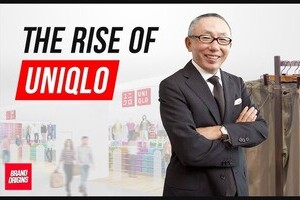The Owner of Uniqlo Becomes the Richest Person in Japan
In recent years, the global fashion industry has witnessed significant shifts in both trends and fortunes. One of the most notable ascents is that of the owner of Uniqlo, who now holds the title of the richest person in Japan. This remarkable achievement is a testament to the brand’s extraordinary growth and strategic positioning. As Uniqlo continues to expand its reach worldwide, its impact on the Japanese economy and retail landscape becomes increasingly profound.
The Rise of Uniqlo: From a Single Store to a Global Fashion Powerhouse
Uniqlo’s journey began modestly, with a single store opening in Hiroshima, Japan in 1984. Initially, it was a far cry from the influential brand it is today. However, from these humble beginnings, Uniqlo steadily expanded its footprint, first throughout Japan and eventually onto the international stage. Key to its success was a unique business model that focused on affordable, high-quality basics that appealed to a broad spectrum of consumers.
As Uniqlo continued to grow, it began to challenge established fashion retailers by emphasizing innovation and technology in its product offerings. The introduction of HeatTech clothing and AIRism line are prime examples, both of which enhanced the brand’s reputation for technical excellence. These advancements not only served to differentiate Uniqlo from competitors but also cemented its status as a leader in the fast-fashion market.
By strategically positioning itself in prime locations and collaborating with high-profile designers, Uniqlo has built a formidable global presence with stores in major markets like the United States, Europe, and China. This expansion strategy has been fundamental in driving the company’s growth, ultimately propelling its owner, Tadashi Yanai, to the pinnacle of Japan’s billionaire rankings.
How Strategic Leadership Catapulted Uniqlo’s Owner to the Top of Japan’s Rich List
Tadashi Yanai, the mastermind behind Uniqlo, has played a key role in steering the company to international acclaim. His strategic leadership has been instrumental in navigating the complex global retail environment. Yanai’s vision for Uniqlo was to create clothing that provides “simple made better,” an ethos that resonates with consumers seeking value and quality.
Yanai’s leadership style emphasizes flexibility and adaptability, enabling Uniqlo to swiftly respond to market needs and fashion trends. This approach has cultivated a corporate culture that thrives on innovation and inclusivity. Under his guidance, Uniqlo has embraced sustainability initiatives and technological advancements, enhancing its appeal to modern consumers and reinforcing its relevance in a rapidly changing market.
Moreover, Yanai’s commitment to cultural understanding and sensitivity has facilitated Uniqlo’s success across diverse markets. By tailoring store layouts, marketing strategies, and product lines to local preferences, Yanai has ensured that Uniqlo maintains its momentum globally. His visionary leadership has not only augmented Uniqlo’s stature in the world but also helped him become Japan’s wealthiest individual.
The Economic Impact of Uniqlo’s Success on Japan’s Retail Industry
Uniqlo’s meteoric rise has had significant repercussions on Japan’s retail landscape. As the flagship brand of Fast Retailing, Uniqlo’s success has bolstered the company’s prominence in the international retail arena. The brand’s expansion has stimulated competition, prompting other Japanese retailers to innovate and differentiate to keep pace.
Beyond competition, Uniqlo’s success has spurred economic activity by creating jobs both domestically and internationally. From sales associates to corporate positions, the company has provided numerous employment opportunities, contributing to economic growth and stability. Furthermore, Uniqlo’s global supply chain has fostered partnerships with manufacturers and suppliers, invigorating various sectors within Japan’s economy.
The ripple effects of Uniqlo’s achievements are also evident in the increased visibility and reputation of Japan as a leading player in the global fashion market. As Uniqlo champions Japanese design and technology worldwide, it also enhances the perception of Japan as a hub for innovation and quality in the fashion industry. Consequently, Uniqlo’s triumph transcends financial success, marking it as a cultural ambassador that elevates Japan’s status on the world stage.
Uniqlo’s owner ascending to the position of Japan’s richest person is more than a personal milestone; it’s an indicator of transformative leadership and strategic prowess. As the brand continues to flourish and influence the global fashion landscape, its story of growth and innovation serves as an inspiring narrative for businesses and entrepreneurs alike. Through its success, Uniqlo not only shapes its future but also carves a legacy that will impact Japan and the world for years to come.






Leave a Reply